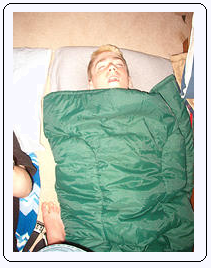The National Sleep Research Project was the largest study of Australian sleep habits even conducted. My gut feeling is that a lot of their findings are just as accurate for people regardless of their location.
Since we all understand that sleep can basically make or break you, I've pulled a couple of facts from their study:
- A new baby typically results in 400-750 hours lost sleep for parents in the first year
- REM sleep occurs in bursts totaling about 2 hours a night, usually beginning about 90 minutes after falling asleep. Here is a wikipedia definiation of REM.
- Dreams, once thought to occur only during REM sleep, also occur (but to a lesser extent) in non-REM sleep phases. It's possible there may not be a single moment of our sleep when we are actually dreamless.
- Seventeen hours of sustained wakefulness leads to a decrease in performance equivalent to a blood alcohol-level of 0.05%.
- The “natural alarm clock” which enables some people to wake up more or less when they want to is caused by a burst of the stress hormone adrenocorticotropin. Researchers say this reflects an unconscious anticipation of the stress of waking up.
- After five nights of partial sleep deprivation, three drinks will have the same effect on your body as six would when you've slept enough.
- Ten per cent of snorers have sleep apnoea, a disorder which causes sufferers to stop breathing up to 300 times a night and significantly increases the risk of suffering a heart attack or stroke.
- Teenagers need as much sleep as small children (about 10 hrs) while those over 65 need the least of all (about six hours). For the average adult aged 25-55, eight hours is considered optimal
- Some studies suggest women need up to an hour's extra sleep a night compared to men, and not getting it may be one reason women are much more susceptible to depression than men.
To read their full 40 points, visit 40 facts about sleep you probably didn't know.
